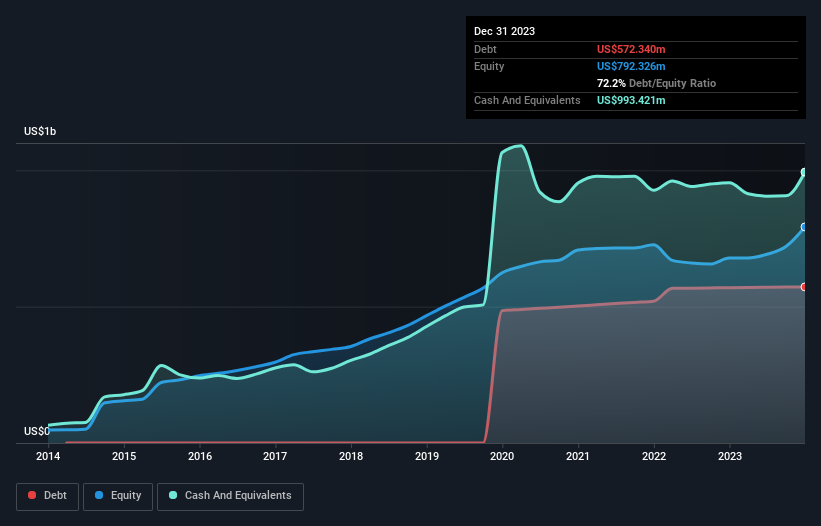- United States
- /
- Software
- /
- NasdaqGS:CYBR
CyberArk Software (NASDAQ:CYBR) Has Debt But No Earnings; Should You Worry?
David Iben put it well when he said, 'Volatility is not a risk we care about. What we care about is avoiding the permanent loss of capital.' When we think about how risky a company is, we always like to look at its use of debt, since debt overload can lead to ruin. As with many other companies CyberArk Software Ltd. (NASDAQ:CYBR) makes use of debt. But is this debt a concern to shareholders?
Why Does Debt Bring Risk?
Generally speaking, debt only becomes a real problem when a company can't easily pay it off, either by raising capital or with its own cash flow. Ultimately, if the company can't fulfill its legal obligations to repay debt, shareholders could walk away with nothing. While that is not too common, we often do see indebted companies permanently diluting shareholders because lenders force them to raise capital at a distressed price. Having said that, the most common situation is where a company manages its debt reasonably well - and to its own advantage. The first thing to do when considering how much debt a business uses is to look at its cash and debt together.
See our latest analysis for CyberArk Software
How Much Debt Does CyberArk Software Carry?
As you can see below, CyberArk Software had US$572.3m of debt, at December 2023, which is about the same as the year before. You can click the chart for greater detail. However, it does have US$993.4m in cash offsetting this, leading to net cash of US$421.1m.

How Healthy Is CyberArk Software's Balance Sheet?
We can see from the most recent balance sheet that CyberArk Software had liabilities of US$1.12b falling due within a year, and liabilities of US$105.3m due beyond that. Offsetting this, it had US$993.4m in cash and US$186.5m in receivables that were due within 12 months. So its liabilities outweigh the sum of its cash and (near-term) receivables by US$50.0m.
Having regard to CyberArk Software's size, it seems that its liquid assets are well balanced with its total liabilities. So while it's hard to imagine that the US$10.8b company is struggling for cash, we still think it's worth monitoring its balance sheet. While it does have liabilities worth noting, CyberArk Software also has more cash than debt, so we're pretty confident it can manage its debt safely. There's no doubt that we learn most about debt from the balance sheet. But it is future earnings, more than anything, that will determine CyberArk Software's ability to maintain a healthy balance sheet going forward. So if you want to see what the professionals think, you might find this free report on analyst profit forecasts to be interesting.
Over 12 months, CyberArk Software reported revenue of US$752m, which is a gain of 27%, although it did not report any earnings before interest and tax. With any luck the company will be able to grow its way to profitability.
So How Risky Is CyberArk Software?
Although CyberArk Software had an earnings before interest and tax (EBIT) loss over the last twelve months, it generated positive free cash flow of US$51m. So although it is loss-making, it doesn't seem to have too much near-term balance sheet risk, keeping in mind the net cash. One positive is that CyberArk Software is growing revenue apace, which makes it easier to sell a growth story and raise capital if need be. But we still think it's somewhat risky. For riskier companies like CyberArk Software I always like to keep an eye on the long term profit and revenue trends. Fortunately, you can click to see our interactive graph of its profit, revenue, and operating cashflow.
At the end of the day, it's often better to focus on companies that are free from net debt. You can access our special list of such companies (all with a track record of profit growth). It's free.
New: AI Stock Screener & Alerts
Our new AI Stock Screener scans the market every day to uncover opportunities.
• Dividend Powerhouses (3%+ Yield)
• Undervalued Small Caps with Insider Buying
• High growth Tech and AI Companies
Or build your own from over 50 metrics.
Have feedback on this article? Concerned about the content? Get in touch with us directly. Alternatively, email editorial-team (at) simplywallst.com.
This article by Simply Wall St is general in nature. We provide commentary based on historical data and analyst forecasts only using an unbiased methodology and our articles are not intended to be financial advice. It does not constitute a recommendation to buy or sell any stock, and does not take account of your objectives, or your financial situation. We aim to bring you long-term focused analysis driven by fundamental data. Note that our analysis may not factor in the latest price-sensitive company announcements or qualitative material. Simply Wall St has no position in any stocks mentioned.
About NasdaqGS:CYBR
CyberArk Software
Develops, markets, and sells software-based identity security solutions and services in the United States, Israel, the United Kingdom, Europe, the Middle East, Africa, and internationally.
Flawless balance sheet with reasonable growth potential.
Similar Companies
Market Insights
Weekly Picks


Crazy Undervalued 42 Baggers Silver Play (Active & Running Mine)


Fiducian: Compliance Clouds or Value Opportunity?

Willamette Valley Vineyards (WVVI): Not-So-Great Value
Recently Updated Narratives


Positioned globally, partnered locally


When will fraudsters be investigated in depth. Fraud was ongoing in France too.


Staggered by dilution; positions for growth
Popular Narratives


MicroVision will explode future revenue by 380.37% with a vision towards success


NVDA: Expanding AI Demand Will Drive Major Data Center Investments Through 2026





